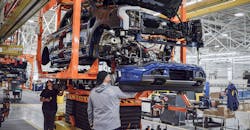Ford Firms Up Key Suppliers to Produce 2 Million EVs by 2026
The race to win in the growing electric vehicle market does is not just happening on the engineering/innovation and technology acquisition sides; it is increasing a competition to secure key suppliers and the raw materials needed to manufacture EV batteries.
Ford laid out its plan today for producing the battery capacity and obtaining the raw materials needed to manufacture its target of 600,000 passenger EVs by year’s end, and 2 million EVs annually by 2026. The plan includes introducing a lower-cost EV battery than the automaker currently uses and scaling up battery production with strategic suppliers.
The supply chain executive leading the charge is Annie Liu, Ford’s new executive director of purchasing for Ford Model E. Liu recently came to Ford from Tesla, where she was the head of supply chain, battery and energy.
“Battery raw material is in critical supply for the entire EV industry,” Liu told reporters at a press conference this morning. “Ford is taking an important first step to secure raw materials directly from mining companies. And we’re building a new EV supply chain that is geographically diverse.”
Liu and other Ford executives announced today that Chinese battery manufacturer Contemporary Amperex Technology (CATL)) will manufacture lithium-iron phosphate (LFP) battery packs for Mustang Mach-E models in North America beginning in 2023, and for F-150 Lightning electric trucks in early 2024. CATL has signed non-binding cooperation agreements with Ford to supply batteries in China, Europe and North America.
The LFP batteries are new to Ford’s electric portfolio, and will add battery capacity in addition to the automaker’s nickel-cobalt manganese (NCM) battery chemistry. The LFP batteries cost 10% to 15% less to produce than the NCM batteries, and makes the company less dependent on a limited supply of rare minerals including nickel (of which Russia is one of the five major producers).
Read More on Ford's battery-cell plans in IndustryWeek sister publication T&D World
CATL is one of the world’s largest battery cell manufacturers and a major supplier of Tesla batteries. It has 10 manufacturing facilities in China and one in Germany.
In addition, Ford supplier LGES is doubling its manufacturing capacity at its plant in Wroclaw, Poland, to increase NCM battery production for the Mustang Mach-E and E-Transit. And Korean EV battery maker SK ON is boosting its planned capacity at manufacturing sites in Atlanta and in Hungary to meet that increased demand from Ford.
Ford said in a statement today it now has 70% of its battery cell capacity sourced to support its 2-million-by-2026 EV goal.
Ford also announced today that it plans to increase the capacity of three as-yet-to-be-complete battery plants in Kentucky and Tennessee, part of the just-inked BlueOval joint venture between Ford and SK On. And Ford has signed non-binding cooperation agreements for sourcing nickel at least through 2026 with mining interests Vale Canada, PT Vale Indonesia and Huayou Cobalt and BHP (Australia). For lithium, Ford recently announced sourcing/exploration with Liontown Resources and Rio Tinto (Argentina).
On the processing side, EcoPro BM and SK On today announced their intent to build a cathode production facility in North America to supply Ford. Ioneer will supply lithium carbonate to Ford from its mine in Nevada. Other new Ford supplier agreements are with Compass Minerals (lithium hydroxide and lithium carbonate from Utah) and Syrah Resources and SK On (natural graphite from Vidalia, Louisiana).
About the Author

Laura Putre
Senior Editor, IndustryWeek
As senior editor, Laura Putre works with IndustryWeek's editorial contributors and reports on leadership and the automotive industry as they relate to manufacturing. She joined IndustryWeek in 2015 as a staff writer covering workforce issues.
Prior to IndustryWeek, Laura reported on the healthcare industry and covered local news. She was the editor of the Chicago Journal and a staff writer for Cleveland Scene. Her national bylines include The Guardian, Slate, Pacific-Standard and The Root.
Laura was a National Press Foundation fellow in 2022.
Got a story idea? Reach out to Laura at [email protected]
